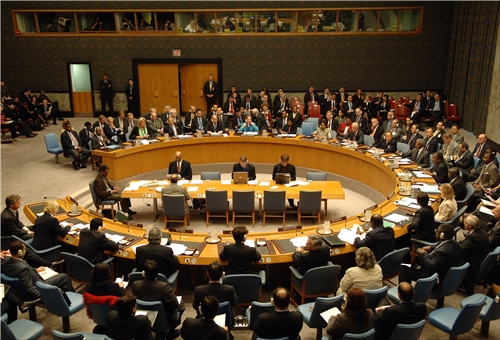UNSC: An Organization For Injustice

The United Nations Security Council (UNSC) is at it again. By failing to do anything about Washington’s new “Coalition of the Killing” to bomb Iraq and Syria on the pretext of fighting the terrorist group of ISIS, a sharply divided UNSC has demonstrated yet again that it cannot be trusted as a podium for international peace and justice.
Under the UN Charter, the Security Council is supposedly “charged with the maintenance of world peace and security.” Yet evidently, it has become an instrument for the five members (United States, Britain, France, Russia, China) to further their political will in international politics. They put forward a draft resolution whenever their interests are jeopardized and pressure the rest of the members to vote for it. At the same time, they veto the resolutions in which the interests of their allies are endangered.
The treatment with Iran is a clear example of such discrimination and prejudice. Since 2006, the UNSC has adopted several resolutions against Iran’s civilian nuclear energy program, and imposed sanctions for what it claims to be “Iran’s failure to come clean.”
This while, all of the reports published by the International Atomic Energy Agency attest to the legality and rightfulness of Iran’s nuclear program. Ironically, 118 members of the Non-Aligned Movement and 57 members of the Organization of Islamic Cooperation unconditionally back Iran’s program. But Tehran should still face sanctions because five bullies say so.
The treatment with Palestine is also another example. Several anti-Israel resolutions have been passed by the UN to condemn Israeli crimes in occupied Palestine, yet they have all been vetoed by Washington, adding to the pains and problems of the Palestinians.
This while all of the reports published by the UN Human Rights Council, Amnesty International, and many other human rights organizations have censured Tel Aviv for its irrefutable crimes.
Judging from the above, now that the War Party in Washington plans to strike both Iraq and Syria with no diplomatic, political or legal mandate from the UN, it is safe to conclude that the sharply divided and inactive Security Council does indeed pursue the interests of its own undemocratic discriminates. The veto-yielding powers are never interested in fairness, justice or political integrity, and perhaps that explains why the Security Council needs drastic reforms.
To this end, the overhaul must include streamlined working methods and a more representative membership that reflects geopolitical realities. The focus should be on categories of veto power, as well as regional representation and expanded membership to include seats for African states, Muslim states and other under-represented groups.
In any event, the UNSC still has some potential for valid exercise of discourse and diplomacy, and only through the implementation of such reforms will there be any hope for international peace and justice. Else, the Security Council will remain, as always, a silent witness/partner to the unending bloodshed and injustice across the globe, principally in occupied Palestine, Libya, Iraq and Syria.







